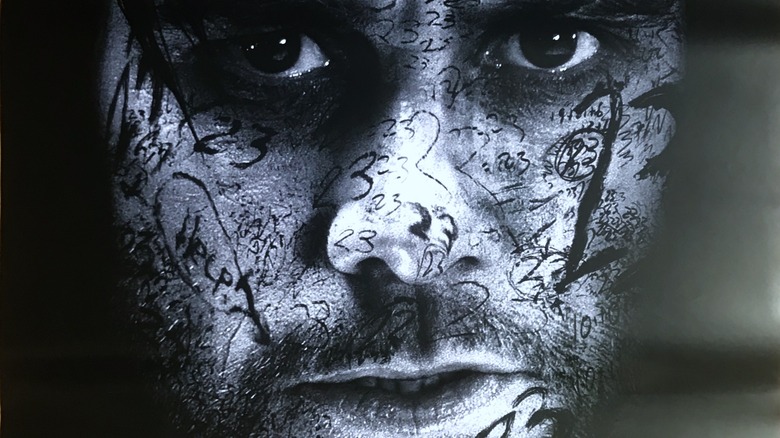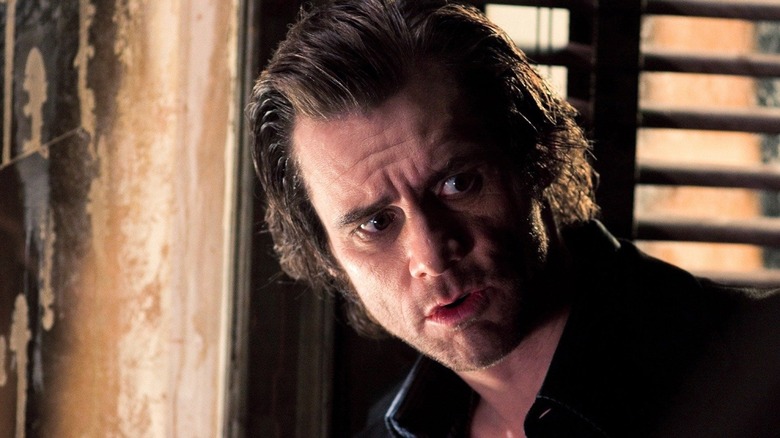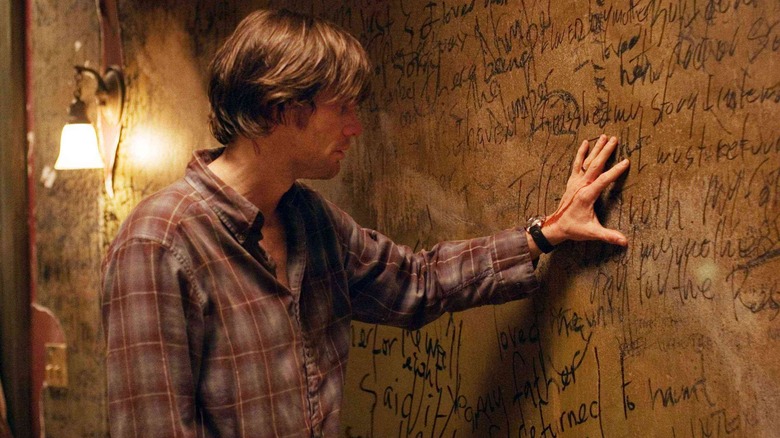Why The Number 23 Was More Personal To Jim Carrey Than You Think
Jim Carrey's success adhered to a well-worn showbiz cliché: It took 15 years of hard work and paying dues to be an overnight success. Carrey worked in stand-up in Toronto as early as 1977, trekked through the club scene, a sitcom ("The Duck Factory"), and a high-profile Fox sketch comedy show ("In Living Color") before achieving the one-two-three punch of "Ace Ventura: Pet Detective," "The Mask," and "Dumb and Dumber," all in 1994. The next few years saw Carry displaying his wild talent for broad, slapstick comedies, and his films were largely enormous hits. By the end of the 1990s, Carrey was expanding into more dramatic work. His first notable bomb in five years also provided one of his better performances: While Miloš Forman's "Man on the Moon," wherein Carrey played Andy Kaufman, initially tanked, it did get some awards attention. Carrey won a Golden Globe. For the next few years, Carrey would return to comedies like "Me, Myself & Irene," "Bruce Almighty," and the high-concept, surrealist romantic film "Eternal Sunshine of the Spotless Mind."
The biggest departure in Carrey's career was probably "The Number 23," a 2007 thriller directed by Joel Schumacher, who had previously worked with Carrey on "Batman Forever." "The Number 23" is about a bland everyman who reads a pulpy detective novel at the recommendation of his wife (Virginia Madsen). He then begins imagining himself and all the people in his life as characters in this book, and he — like the book's protagonist — becomes obsessed with the numerology behind the eponymous digit. The obsession also leads to the degradation of his identity, inspiring him to contemplate murder.
"The Number 23" was not warmly received by critics — it currently has a mere 8% approval rating on Rotten Tomatoes — and it wasn't a runaway success, though it did make its money back. For Carrey, however, the content of "The Number 23" was familiar to him prior to the film's production. Is it a coincidence that Carrey's production company is called JC23 Entertainment?
How it started
When Collider asked Jim Carrey why he chose the name, he pointed out some keen coincidences. One should bear in mind that Carrey was an aspirational performer, and he was in a constant state of actualizing success. He famously wrote himself a $10 million check in 1985 as a promise to be successful in the future. The number 23 spoke to him of that success, he told Collider:
"... A friend of mine in Canada kind of handed it down to me. He was seeing it everywhere: added up license plates, doing all these things. He had a book full of 23 phenomena and he handed it to me, and I said he was crazy and then I started seeing it everywhere. And then one day, a few years later after it had entered my life in a big way and I was driving my friends crazy, somebody handed me the 23rd Psalm, a book on the 23rd Psalm, "the valley of the shadow of death," living without fear basically, knowing you're taken care of. So I thought that was great progression from Pit Bull Productions, which is kind of like grabbing hold of life and just not letting it go, to not sweating it.
Pit Bull Productions was the name of Carrey's first production company. That, too, found an eerie parallel in the script for "The Number 23":
"So I named the company that, and then I explained it to a friend and he said, 'Well, I just read [a] script called "The Number 23.'" And I said, 'I have to see this.' And I read the script, I was compelled by it, and I was freaked out actually because the first page of the script was actually originally me trying to capture a pit bull! The Pit Bull Productions to JC23 was not lost there."
Wild.
The 23 enigma
The 23 enigma had existed prior to Fernley Phillips' screenplay. Cult author Robert Anton Wilson (of "Prometheus Rising," The Illuminatus! Trilogy, and other playful philosophical and theological tomes besides) noticed the 23 phenomenon after reading about it in a few William S. Burroughs stories. The numerology of 23 made its way into several Wilson books, and it was one of the divine numbers in the "Principia Discordia," a religious text devoted to Eris, the Goddess of Discord, written in 1963 by Malaclypse the Younger and Lord Omar Khayyam Ravenhurst (actually Greg Hill and Kerry Thornley). The 23 phenomenon also worked its way into playful fringe religious groups like The Church of the SubGenius.
Be sure to read up on the British art rock duo The KLF sometime, and how they staged a 23-yearlong project that involved burning a pile of money on stage.
Given the winking nature of Discordians and SubGenii, one can perhaps take the legitimacy of 23 numerology with a grain of salt. While it's fun to explore numerological theory, most numerology stems from confirmation bias; you find the number specifically because you're looking for it. The bias is smartly addressed in the screenplay for Joel Schumacher's movie. Start looking for the number 23, and you'll see it. Start looking for 71, you'll see that too.
So was Jim Carrey's involvement in "The Number 23" a coincidence? Yes, most likely. But could it have been a cosmic force, pushing him to make this movie? I'll leave that one to you.


